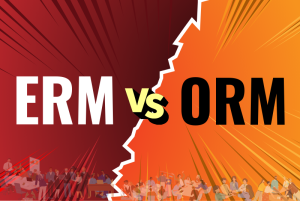This is a truly loaded question – and sometimes the answer may be hard to swallow! But measuring corporate performance is a must; today’s business environment demands it. Measuring corporate performance quintessentially means determining how to carry on managing the business, and ensuring its sustainability. Besides, if you don’t know how you’re doing, how are you going to improve? If you’re cruising along without an honest evaluation, how would you know if you’re doing well, or about to tank? Evaluation is important because it may point out pitfalls and shortfalls which may be mitigated before they do extensive, lasting damage. But how should it be done?
Evaluating corporate performance is a critical component of Enterprise Risk Management and entails keeping an eye on everything, from how the Board is behaving, to what your stakeholders think of you. While it demands constant vigilance, it also contribute towards the achievement of enterprise-wide strategy and helps management walk the fine line between keeping daily business humming, and achieving the organisation’s long-term goals. When it comes to measuring corporate performance, firms need proper tools and processes, particularly access to the appropriate “3C”s of data: clear, concise and current. If decisions have to be made, providing the Board and management with reliable, up-to-the-minute data is imperative.
One of the advantages of collecting such data and keeping it current is that it will always indicate what the firm may be lacking, which will point to what needs to be fixed, updated or improved. Identification, reviewing, analysis, fixing, updating and improving are part of the process of measuring, and a reflection of the performance of the firm. Measurement of this sort is never easy, and nowadays, the difficulty is compounded by dynamic environments, external pressures and tighter regulations. There is the constant expectation of increasing transparency to manage, and the need, simultaneously, for confidentiality in the face of growing competition that pushes firms to divulge their strategy.
Organisations need special tools, new methods and different skill sets with which to develop different strategies to spur their respective businesses. They have very little choice if they want to stay in business. Measuring really keeps corporations on their toes, cultivates anticipation and spurs preparedness. Traditional performance measurement systems have been found to be inadequate. Many businesses often find that measurements have to be customised – which will, as a matter of course, be more challenging – although two basic performance measurement elements should always be maintained: expertise and communication. The right expertise helps the organisation to sort through oceans of data to find meaningful, relevant information, while having the right channels of communication will direct action to where it is needed.
But what constitutes “meaningful” and “relevant”? Again, it depends on the organisation; this is one of the most pressing reasons for bespoke performance measuring systems. Current information on operations, market share, inventory and finance, details on revenue and expenditure are just some of the items needed. A finger should constantly be kept on the pulse of the market – and an eye on the competition! Besides giving a picture of its overall health, an organisation’s performance-measuring efforts could also indicate if it is keeping to its strategies or not; anything out of place will become apparent from the flow of information, and management can move quickly to rectify it.
But performance measurement is not the job of just one or two people; it is a team effort. To be truly effective, it should be applied organisation-wide. Teams set up to undertake this task should limit themselves to the measurements that work, and not try to apply too many, which may result in information overload and/or duplication of activity, loss of time and misallocated resources. The results of ongoing corporate performance measurement may not be immediately obvious, which may give rise to doubt as to whether it really improves the firm’s bottom line. But it is worth the effort because it helps the organisation to better understand its objectives. And while it may get tedious and onerous at times, it will mitigate somewhat the possibility (and pain) of being surprised by completely unanticipated events relating to strategic deliverability or financial sustainability.





























